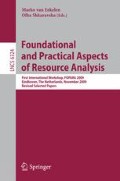Abstract
In the paper’s first part, we present a method for certifying that the values computed by a first order imperative program will be bounded by polynomials in the program’s inputs. Our method does not yield concrete polynomials, but shows existence of polynomial bounds and upper bounds to their polynomial degrees. In the second part of the paper, we lift our method to allow analysis of higher order programs.
Access this chapter
Tax calculation will be finalised at checkout
Purchases are for personal use only
Preview
Unable to display preview. Download preview PDF.
References
Ben-Amram, A.M., Jones, N.D., Kristiansen, L.: Linear, polynomial or exponential? Complexity inference in polynomial time. In: Beckmann, A., Dimitracopoulos, C., Löwe, B. (eds.) CiE 2008. LNCS, vol. 5028, pp. 67–76. Springer, Heidelberg (2008)
Benzinger, R.: Automated higher-order complexity analysis. Theor. Comput. Sci. 318(1-2), 79–103 (2004)
Bonfante, G., Marion, J.-Y., Moyen, J.-Y.: Quasi-interpretations, a way to control resources. Theoretical Computer Science (to appear)
Crolard, T., Polonowski, E., Valarcher, P.: Extending the loop language with higher-order procedural variables. ACM Trans. Comput. Logic 10(4), 1–37 (2009)
Jones, N.D., Kristiansen, L.: A flow calculus of mwp-bounds for complqexity analysis. ACM Trans. Comput. Logic 10(4), 1–41 (2009)
Kristiansen, L., Jones, N.D.: The flow of data and the complexity of algorithms. In: Cooper, S.B., Löwe, B., Torenvliet, L. (eds.) CiE 2005. LNCS, vol. 3526, pp. 263–274. Springer, Heidelberg (2005)
Marion, J.-Y., Péchoux, R.: Sup-interpretations, a semantic method for static analysis of program resources. ACM Trans. Comput. Logic 10(4), 1–31 (2009)
Meyer, A.R., Ritchie, D.M.: The complexity of loop programs. In: ACM ’67: Proceedings of the 1967 22nd National Conference, pp. 465–469. ACM, New York (1967)
Niggl, K.-H., Wunderlich, H.: Certifying polynomial time and linear/polynomial space for imperative programs. SIAM J. Comput. 35(5), 1122–1147 (2006)
Author information
Authors and Affiliations
Editor information
Editors and Affiliations
Rights and permissions
Copyright information
© 2010 Springer-Verlag Berlin Heidelberg
About this paper
Cite this paper
Avery, J., Kristiansen, L., Moyen, JY. (2010). Static Complexity Analysis of Higher Order Programs. In: van Eekelen, M., Shkaravska, O. (eds) Foundational and Practical Aspects of Resource Analysis. FOPARA 2009. Lecture Notes in Computer Science, vol 6324. Springer, Berlin, Heidelberg. https://doi.org/10.1007/978-3-642-15331-0_6
Download citation
DOI: https://doi.org/10.1007/978-3-642-15331-0_6
Publisher Name: Springer, Berlin, Heidelberg
Print ISBN: 978-3-642-15330-3
Online ISBN: 978-3-642-15331-0
eBook Packages: Computer ScienceComputer Science (R0)

